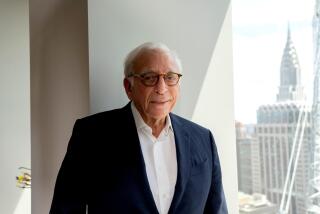Author-Bidder Prepared to Use Either Carrot or Stick : Sosnoff Hopes Caesars Team Will Stay On
- Share via
Martin T. Sosnoff, Wall Street money manager and author of a new book that takes up the cudgel on behalf of small investors, said Thursday that he hopes that “in the end” his negotiations to buy casino operator Caesars World will become friendly and that Caesars Chairman Henry Gluck will stay, along with “everyone else.”
“That’s what we’d like,” Sosnoff said in a telephone interview. “And they would have a (stock) participation in the company.”
Sosnoff told Gluck in a written message Monday that he believes operating management of the Los Angeles-based company had performed well and that “appropriate consideration should be given to a significant equity interest for them in the company following the acquisition.”
And he added on Thursday: “There are no hard feelings so far. . . . I like Henry.”
However, Sosnoff indicated that he is prepared to shift to a more hard-boiled mode, depending on management’s still-awaited reaction to his offer.
Already, he has filed suit this week in Miami against Caesars and its board. A copy of the suit shows that it complains, among other things, of “extraordinary compensation” given to Gluck and Caesars President J. Terrence Lanni and two senior vice presidents, Philip L. Ball and Roger Lee, in the form of stock bonuses, deferred compensation and other arrangements.
Asked Thursday about the timing of the suit to coincide with the offer, Sosnoff said: “That is what our lawyers decided to do. It is known as a preemptive strike.”
Referring to his invitation Monday to Caesars management to sit down with him and negotiate an acquisition agreement, Sosnoff said Thursday: “Barring (a friendly outcome), we would have to replace a few people. Obviously, we have some plans for that.”
Meanwhile, he said, “they have to respond in 10 days. . . . I think this is the first act. The second act will start next week.”
Caesars World continued Thursday to be noncommittal pending an announcement of its response to Sosnoff, its largest shareholder since 1983 but one whose requests for board representation have been rebuffed previously. Nor has Caesars World commented on Sosnoff’s lawsuit.
Sosnoff is chairman of publicly owned Atalanta/Sosnoff Capital Inc., a money-management concern. He proposes to pay $28 a share--a total of $725 million--to the public for the 86.4% of Caesars’ stock that he does not already own. The casino firm owns Caesars Palace and Caesars Tahoe in Nevada and Caesars Atlantic City in New Jersey.
Denying some speculation that he never intended to end up buying the company, he insists: “I’d love to. We have the financing available, and it’s a fair price.”
Sosnoff, 55, says he has been enamored of Las Vegas “since I was 19 years old.” But he makes it clear that he himself would not try to operate Caesars if he wins it. “I’m not an operator,” he says. “I’ve got a company (Atalanta/Sosnoff) to run.”
According to his biographical handout, Sosnoff began as a junior securities analyst for E. F. Hutton & Co. in 1958, “progressed rapidly” and became a chartered financial analyst in 1960, and went to a private investment management firm in 1963 as chief investment officer.
Called Passive Investor
He founded his own firm in 1968 and just last June took it public; he says it was the “first privately held money management company to go public.” Sosnoff retains a majority interest.
Atalanta/Sosnoff Capital reports that it manages more than $5 billion in assets for institutional accounts and individual investors. Sosnoff has been known to buy large stock positions for himself, but has made a reputation for being a relatively passive investor.
Despite his success, he has acquired a reputation for being anti-establishment. He contends that the corporate-investment superstructure has disenfranchised the individual U.S. investor. His new book, “Silent Investor, Silent Loser,” published this week, takes that as its basic theme.
Among his targets are large corporations that pay “greenmail” to the raiders, a practice he wants to see outlawed.
An art connoisseur, Sosnoff includes in the book a number of reproductions of classic paintings, a most unusual feature for a tome on the business of business.
Newspaper Columnist
Besides launching his offer for Caesars, Sosnoff added to his busy week the beginning of a weekly column he writes for the New York Post. For many years he wrote a column for Forbes magazine and contributed to many other financial publications.
In 1975 he published a book, “Humble on Wall Street,” in which he told of becoming wealthy in the 1960s by trading stocks that had been spurned by other investors.
Why did he make his move on Caesars after nearly four years?
“The (company’s) operating numbers were getting better fast. The economics (of the high yield bond market) became better. . . . We felt a financial window open for us. We didn’t know how long it would last, so we took it.”
More to Read
Inside the business of entertainment
The Wide Shot brings you news, analysis and insights on everything from streaming wars to production — and what it all means for the future.
You may occasionally receive promotional content from the Los Angeles Times.










